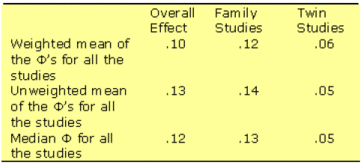The WAGER Vol. 7(9) – Nature or Nurture
Last week’s WAGER discussed a study that reported on the association between genetic patterns and the likelihood that pathological gamblers had comorbid mental illness. Such genotype/phenotype relationships are interesting because they suggest that certain individuals might be more susceptible than others to developing problem gambling behavior. This week’s WAGER discusses a meta-analysis of published studies that attempts to identify a genetic predisposition for problem and pathological gambling (Walters, 2001).
Walters identified 19 behavior genetic studies, both in and outside the U.S., by searching MEDLINE, PSYCINFO, and articles published in the Journal of Gambling Studies. Of these 19, 17 were family studies1 and 2 were twin studies. Walters included family studies in the meta-analysis when they incorporated a control group (either non-gambling or non-problem gambling).
The author correlated current problem gambling status with family history of problem gambling to measure the relationship between family history and problem gambling status. Walters found a small but significant overall effect2 size (Weighted ¦3 = .10, unweighted ¦ = .13. The first value was weighted by the number of subjects included in each study) indicating a positive relationship between family history and current gambling status. Both family and twin studies achieved significant effects (Table 1).
Table 1. Effect Sizes for Studies on the Gene-Gambling Relationship
Despite a significant overall effect size, Walters suggests that the familial effect is small. A moderator variable analysis of the family studies suggested that the familial effect may vary by gender and severity of problem gambling behavior.
This meta-analysis suggests a small potential genetic effect on problem gambling. However, there were only two twin studies and the family interview studies relied mainly on the self-report of subjects about their family histories. Given that the accuracy of self-report is often questioned, it is possible that these studies might be based on inaccurate information. Researchers might want to consider investigating the gambling behaviors of related children adopted into different homes to further clarify the role of genetic and environment contributions to the development of problem gambling behavior.
This study had some methodological limitations. Walters did not adequately explain the inclusion and exclusion criteria for the research studies he selected other than limiting the studies to those that included control groups. Neither did he fully explain how the moderator variables were chosen. Thus, it is not clear whether factors other than gender and problem severity might also influence inherited behavior.
Nevertheless, this meta-analysis is an important contribution to the field of inquiry around problem gambling. Further insight into the role of genetics in developing problem behavior can only aid our understanding. Also, a survey of the literature highlights existing gaps that need further examination. Walters notes that this meta-analysis relies on studies that utilize non-rigorous research methods (i.e. second hand self-report). So, in addition to providing evidence for a genetic association, this research also suggests that further genetic research with more rigorous methodology is needed.
Notes
1 There are two types of family studies: the family history method, which relies on the respondent’s knowledge of their family members, and the family study method in which investigators interview family members directly. All of the family studies included in this meta-analysis, except one, used the family history method.
2 The effect size refers to the strength (or magnitude) of the relationship in the population, in this case the gene-gambling relationship.
3 The phi coefficient is a correlation coefficient designed to measure the degree of association between two dichotomous variables. Phi is similar to the correlation coefficient in its interpretation.
References
Walters, G. (2001). Behavior genetic research on gambling and problem gambling: A preliminary meta-analysis of available data. Journal of Gambling Studies, 17(4), 255-271.
